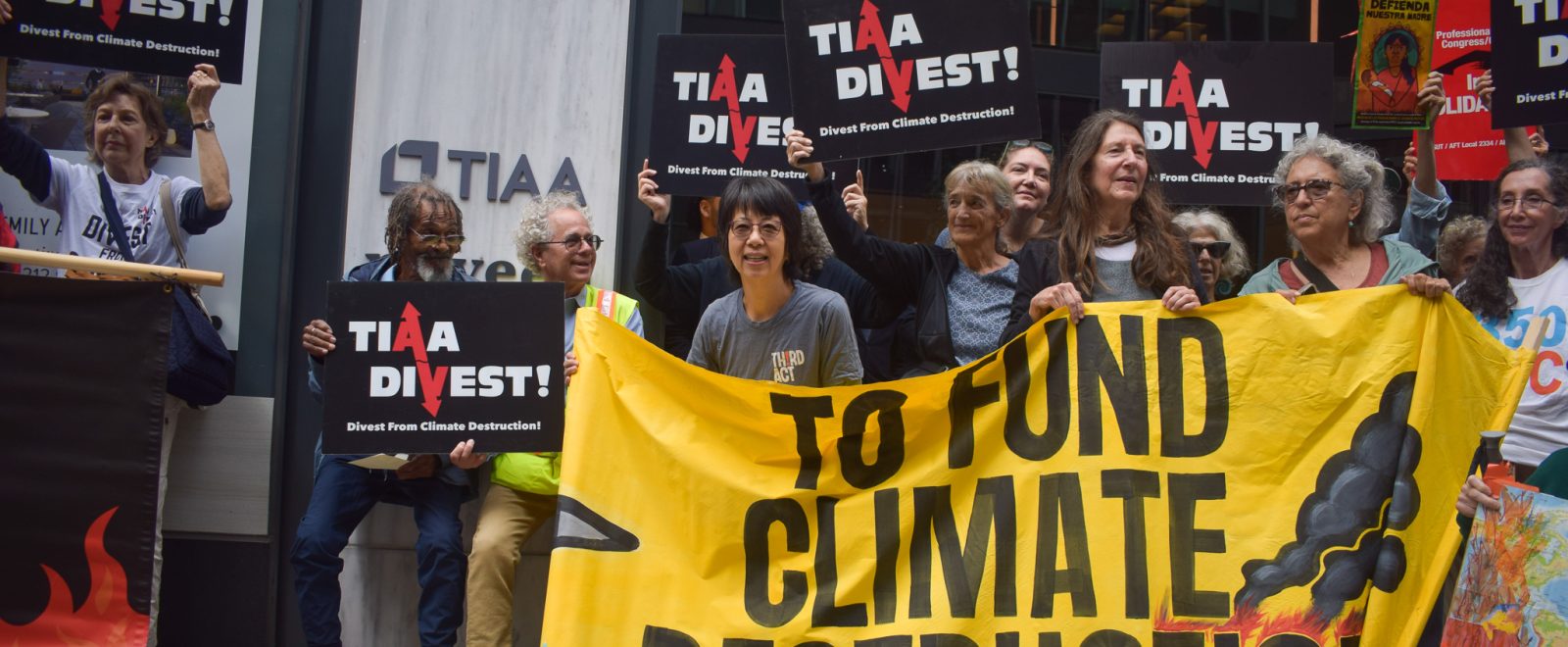For New York Climate Week, about 80 people gathered outside the headquarters of the Teachers’ Insurance and Annuity Association with chants, speeches, banners, and signs. We demanded that TIAA stop using clients’ retirement savings in business deals that hurt the climate, the environment and local communities.
Black farmers from the Phillips County, Arkansas organization TIAA-Exposed were joined at TIAA HQ by climate activist Bill McKibben, who, like many education and non-profit workers, is also a TIAA client. McKibben opened the rally by saying:
“The reason we’re here is there’s a hell of a lot of money here, and that money is being used badly. It’s being used to break people down, and to break down the ecosystem that this planet depends on.”
ActionAid USA joined this fight after discovering that TIAA, our retirement plan manager, promotes itself as a socially responsible investor while being a leading investor in coal bonds. Even more alarming, TIAA is the world’s top speculator in rural land, with over 3 million acres used for industries that drive climate change and pollute the environment with fossil fuel-based chemicals.
A Black farmer who spoke at the rally said that his father and ten friends had died from cancer and illness related to pesticide exposure and that he could no longer successfully grow food crops due to pesticide spraying:
“The poison is drifting over the crops, our [gardens and orchards] too. Now we cannot grow anything. My peach trees, apple trees, grapes all gone; I haven’t grown a grape, a peach for five years. I’m here crying out for some help.”
Following the rally, nearly 100 people joined a hybrid panel discussion where Arkansas farmers discussed the economic, social, and environmental impacts of TIAA’s farmland takeover. They called for a meeting with TIAA’s CEO, an end to pesticide spraying, land restitution, and reparations for profits gained through racial violence and discrimination.
TIAA has acquired over 46,000 acres (an area larger than Washington, D.C.) in Phillips and Desha Counties, Arkansas, surrounding Black communities like Elaine and Lake View. This land grab profits from a legacy of racial violence and land theft, including the 1919 Elaine Massacre. For a century, systemic racism has persisted through indiscriminate pesticide spraying and the denial of economic development, healthcare, and education, contributing to an ongoing “slow massacre” of these communities.
Last fall, I visited TIAA’s land in Phillips County, Arkansas, and witnessed the same environmental issues seen on their properties elsewhere. TIAA is depleting aquifers, neglecting cover crops, and allowing tillage up to drainage ditches, leading to soil erosion and runoff of chemical fertilizers and pesticides into the Mississippi River and smaller waterways. I saw a pesticide spray plane taking off and flying over TIAA land, and I had to take shelter from chemicals drifting in the air when a spraying tractor approached the end of the field. I saw fires lit in TIAA fields to burn post-harvest organic matter, releasing carbon into the atmosphere instead of enriching the soil.
TIAA’s agriculture does not feed people who face food insecurity, Instead it provides cotton to the fast fashion industry. Its soy and corn are burned as fuel for cars and trucks and used to feed the factory farming industry, which is so damaging to the climate. This type of agriculture is second only to the fossil fuel industry in its greenhouse gas emissions.
However, the immediate impact of this type of farming on communities cannot be ignored. This kind of agriculture does not provide local jobs, help local businesses flourish, or grow food as smaller family farms can. Instead, all processes are mechanized and managed from a distance, with relatively few seasonal workers being brought in from far away. The local economy has become depressed to the point where no grocery store is left except Dollar General, which has no fresh food. There is no local healthcare, and schools are closed for lack of funding while children are bussed to distant districts.
TIAA doesn’t disclose the specific pesticides used, but residents have seen containers for glyphosate, dicamba, and paraquat, sometimes irresponsibly burned. Defoliants and insecticides are also used on cotton and soy. Pesticide drift destroys local crops like peas, okra, and fruit trees, while runoff contaminates lakes and rivers and harms aquatic life.
The wealth of the water and soil that should benefit local communities is being depleted and extracted to the pockets of TIAA executives and a farming company based hundreds of miles away. TIAA clients do not want to benefit from or support this kind of racial injustice or business deals. It’s time to speak out and have our voices heard.
We know that TIAA executives heard the voices of Black farmers and clients gathered at the front door of the New York City headquarters during Climate Week. While they did not come down to speak to us, an email suggested a future meeting. We are waiting to see if TIAA’s governors and executives will listen and take action to meet the demands of communities and clients. In the meantime, all concerned citizens should join the coalitions calling for TIAA to divest from fossil fuels and stop land grabs.



